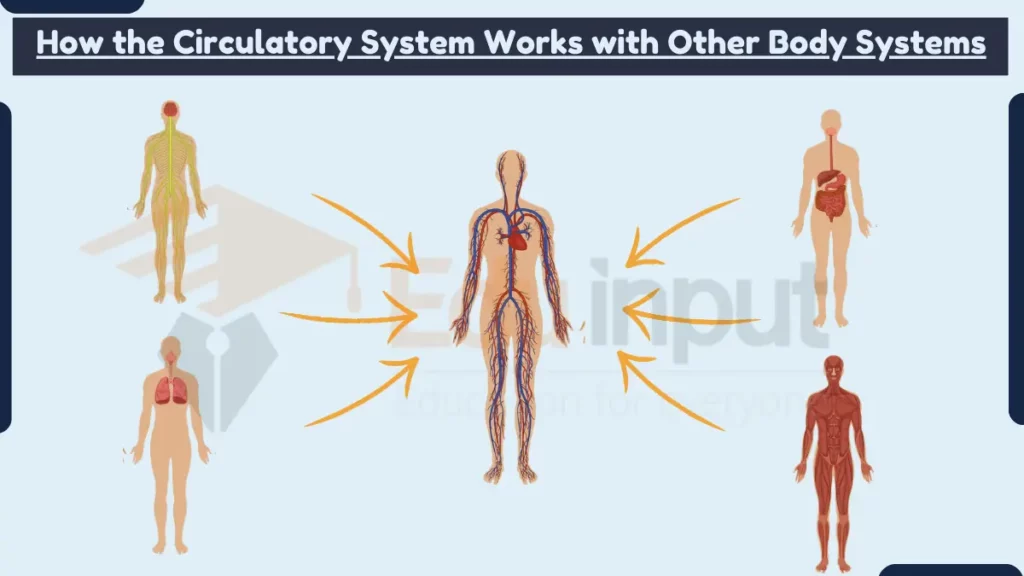How the Circulatory System Works with Other Body Systems
The circulatory system coordinates the function of all the other body systems by delivering oxygen and nutrients to the cells and removing waste products. It also plays a role in transporting hormones, immune cells, and other important molecules throughout the body.

Coordination of Circulatory system with other systems
Here’s how the Circulatory system interacts with other body systems:
1. Coordination with Respiratory System
The circulatory system works closely with the respiratory system to deliver oxygen to the cells and remove carbon dioxide. The lungs oxygenate the blood by allowing oxygen to diffuse from the air into the bloodstream.
The heart then pumps this oxygenated blood throughout the body. The blood releases oxygen to the cells and absorbs carbon dioxide, which is transported back to the lungs and exhaled.
2. Coordination with Digestive System
The circulatory system also works closely with the digestive system to absorb nutrients from food and deliver them to the cells. The digestive system breaks down food into smaller molecules that can be absorbed into the bloodstream.
The blood then transports these nutrients to the cells, where they are used for energy, growth, and repair. The circulatory system also helps to remove waste products from the digestive system, such as urea and ammonia.
3. Coordination with Excretory System
The circulatory system works with the excretory system to remove waste products from the body. The kidneys filter the blood to remove waste products, such as urea and creatinine. These waste products are then excreted in the urine.
The circulatory system transports the urine from the kidneys to the bladder, where it is stored until it can be eliminated.
4. Coordination with Endocrine System
The circulatory system works with the endocrine system to transport hormones throughout the body. Hormones are chemical messengers that regulate various bodily functions, such as growth, development, and metabolism.
The endocrine glands secrete hormones into the bloodstream, and the circulatory system transports them to target organs and tissues.
5. Coordination with Muscular System
The circulatory system works with the muscular system to deliver oxygen and nutrients to the muscles and remove waste products. When the muscles are working, they require more oxygen and nutrients.
The circulatory system responds to this increased demand by increasing the blood flow to the muscles. The circulatory system also helps to remove waste products from the muscles, such as lactic acid.
6. Coordination with Skeletal System
The circulatory system works with the skeletal system to produce blood cells and transport them throughout the body. Blood cells are produced in the bone marrow, which is located inside the bones.
The circulatory system transports blood cells from the bone marrow to all parts of the body. The circulatory system also transports calcium and other minerals to the bones to maintain bone health.
7. Coordination with Immune System
The circulatory system works with the immune system to transport immune cells throughout the body and distribute them to areas of infection or injury. The immune system is responsible for defending the body against infection and disease.
Immune cells, such as white blood cells, travel through the bloodstream to identify and destroy pathogens. The circulatory system also helps to transport antibodies and other proteins involved in immunity throughout the body.
8. Coordination with Nervous System
The circulatory system works with the nervous system to deliver oxygen and nutrients to the brain and other nerve cells. The brain is a very active organ and requires a lot of energy to function properly.
The circulatory system provides the brain with the oxygen and nutrients it needs to function optimally. The circulatory system also helps to remove waste products from the brain, such as carbon dioxide.



Leave a Reply